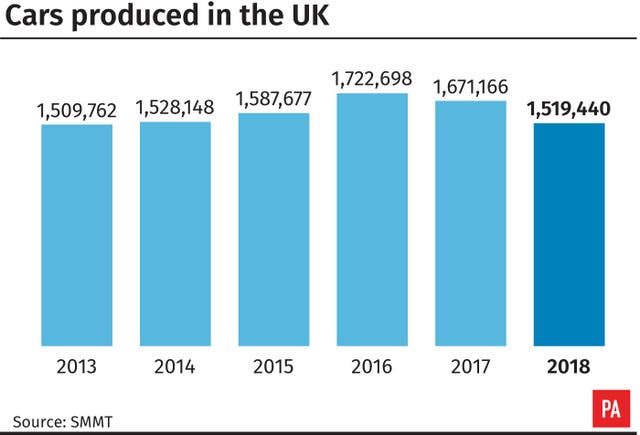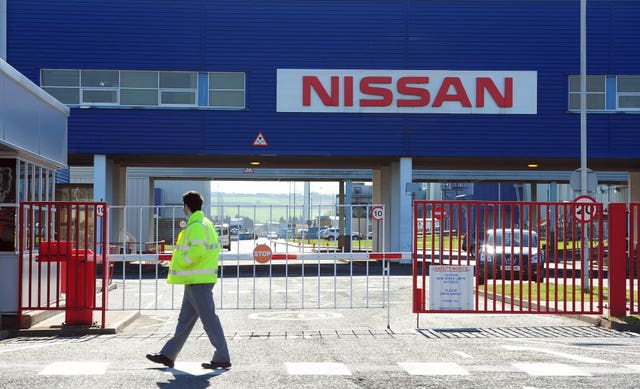Car giant Nissan has confirmed in a letter to workers that the next-generation X-Trail, planned for its Sunderland plant, will instead be made in Japan.
The decision is another huge blow to the UK’s car industry which has been warning for years about the impact of Brexit uncertainty on top of other problems such as a slump in diesel sales.
Nissan chairman Gianluca de Ficchy said in the letter that much had changed since the Japanese firm announced plans to build a new Qashqai and X-Trail in the UK in October 2016.
“At that time they were both planned as ‘traditional’ models, powered by internal combustion engines. X-Trail was already going to be made in Kyushu, but there was a good business case for bringing production to Europe as well.
“Since that time, as you know, the environment for the car industry in Europe has changed dramatically. To meet the changing emissions regulations we’ve had to invest much more in new powertrains for our future models like X-Trail. At the same time, the volume forecasts for X-Trail in Europe have reduced.
“For those reasons the company has decided to optimise our investments and concentrate production in Kyushu, instead of adding another production site. For the European business, this does not change the fact that X-Trail is – and will continue to be – a crucial model for us.
“Today’s announcement will be interpreted by a lot of people as a decision related to Brexit. We have taken this decision for the business reasons I’ve explained, but clearly the uncertainty around the UK’s future relationship with the EU is not helping companies like ours to plan for the future.”

The letter continued: “With the UK’s departure from the EU on March 29 getting closer every week, we have a taskforce in place, reporting to me, that is considering all of the possible scenarios and the potential impact on the business.
“As a responsible business with 16,000 employees in the region, I want you to know that we are preparing across all functions, and with our supply chain, for anything that might impact our current business model. When the time comes to initiate any of those plans, we will be ready, and we will communicate with full transparency to all of you.”
Nissan was still investing heavily in the new Juke model and the next-generation Qashqai, said Mr de Ficchy.
“Since they were originally allocated, those two models have also needed a lot of additional investment to meet the new emissions regulations and to electrify their powertrains.
“The team in the plant still has the full confidence of the company.”

Nissan executive vice president for manufacturing and supply chain management, Hideyuki Sakamoto, said: “A model like X-Trail is manufactured in multiple locations globally, and can therefore be re-evaluated based on changes to the business environment.
“As always, Nissan has to make optimal use of its global investments for the benefits of its customers.”
Mr de Ficchy said: “Nissan is investing heavily in new technologies and powertrains for the next generation of vehicles in our Sunderland plant. To support this we are taking advantage of our global assets, and with X-Trail already manufactured in Japan, we can reduce our upfront investment costs.
“We appreciate this will be disappointing for our UK team and partners. Our workforce in Sunderland has our full confidence, and will continue to benefit from the investment planned for Juke and Qashqai.”
Bad news for future investment in Sunderland because of Brexit. Nissan casts further gloom on car industry with X-Trail blow @bphillipsonMP @JulieElliottMP @annaturley @PaulWilliamsMP @CatMcKinnell pic.twitter.com/wnK8VUK0Hq
— PhilWilsonMP (@MPphilwilson) February 2, 2019
The Sunderland plant, which opened in 1986, employs 7,000 workers, producing around 2,000 cars a day.
Other Nissan models built at the site include the Qashqai, Juke, Q30, Note and the zero-emission electric Leaf.
The decision follows figures last week showing car production slumped by almost a 10th last year, leaving the industry on “red alert” amid continued Brexit uncertainty.
The Society of Motor Manufacturers and Traders (SMMT) said investment had effectively “stalled” amid fears over the UK’s future trading prospects with the EU.
Just over 1.5 million cars left UK factories in 2018, a 9.1% decline on the previous year, and the lowest for five years. Production of diesel cars was down by 22% to 561,000 last year.
The Nissan news shows clearly that Theresa May must end this no-deal nonsense. pic.twitter.com/UhoAsgoNJj
— Vince Cable (@vincecable) February 3, 2019
SMMT chief executive Mike Hawes said the fall in investment was “deeply depressing” and should send a strong signal to politicians to secure a Brexit trade deal.
Ford is seeking up to 400 voluntary redundancies at its engine plant in Bridgend, south Wales, while Jaguar Land Rover is to reduce its 44,000 workforce by 4,500 under plans to make £2.5 billion of cost savings – with most of the cuts in the UK.
Japanese firm Honda has announced six non-production days in April under contingency plans to mitigate the risk of disruption to production at its Swindon factory after the UK leaves the EU.
Unite officer Steve Bush said: “This is very disappointing news for Sunderland and the North East, and reflects the serious challenges facing the entire UK auto sector.
“The Government’s mishandling of the transition away from diesel allied to the continuing uncertainty around our future trading relationship with the EU are extremely unhelpful when the sector ought to be focused on preparations for electrification.
“While this decision is naturally not good news, we want to reassure our members that job levels at the plant will remain the same, even though they are being cut elsewhere in the industry.
“However, we remain seriously concerned though that the apprenticeships and additional jobs that come with future investment and which this community so desperately needs will be lost.
“Unite now expects the company to work with us to ensure full preparations for Brexit in which jobs and investment are prioritised, which can be best achieved by our representation on the task force established by Nissan, and through continuous dialogue between the company and the union.”
Just saying #Nissan #Sunderland #GTTO #UnSeatTories"We want to be working with companies like Nissan to ensure we maintain that competitiveness with the UK being a global leader in free trade." – #TheresaMay (28 Oct 16) #marr pic.twitter.com/exnnP4Rpg3
— Jerry Hicks (@JerryHicksUnite) February 3, 2019
Business Secretary Greg Clark said: “Nissan’s announcement is a blow to the sector and the region, as this was to be a further significant expansion of the site and the workforce.
“The company has confirmed that no jobs will be lost. They have reiterated today their commitment to the UK by continuing to manufacture in Sunderland the current Qashqai, Leaf and Juke models and the new Qashqai model from 2020.
“The UK automotive industry is a vital sector for the British economy which draws on our combination of rich automotive heritage and cutting-edge innovation.
“Its role in providing high skilled well-paid jobs, innovative R&D and investment is why we are determined to build on these strengths to make the UK a leader in the next generation of autonomous and electric vehicles through the Automotive Sector Deal, as part of our modern Industrial Strategy.”
The Business Secretary said in October 2016 that Nissan were given four assurances “to give them confidence to continue investing in the UK”, including continued support for the competitiveness of the automotive sector through investment in skills and training the local workforce, and a commitment to research and development, in particular the take-up of ultra-low emission vehicles.
Rebecca Long-Bailey, shadow business secretary, said: “This is a blow not only to future investment in Sunderland but also to Britain’s industrial strategy.
“As Nissan stated, continued Brexit uncertainty is not helping businesses plan for the future.
“The Government’s chaotic handling of Brexit has been the root cause of business uncertainty.
“There are serious questions that the Government must now answer on Monday, not least what was in the secret Brexit deal it issued to Nissan and why this was no longer good enough.”
